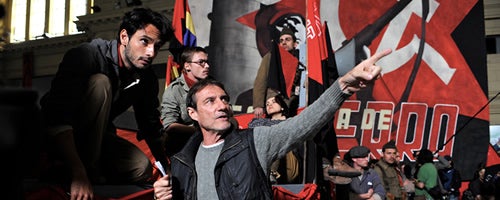Director Roland Joffé Explains "There Be Dragons"
Known for his directing work on Oscar-winning, historically-based films, The Killing Fields and The Mission, Roland Joffé has now sets his sights on the Spanish Civil War in his new movie, There Be Dragons. Starring Charlie Cox, Wes Bentley, and Dougray Scott, the film follows the life St. Josemaria Escriva, a Roman Catholic priest from Spain who eventually founded Opus Dei.
An agnostic, Joffé is still intrigued by faith and spirituality, a curiosity that compelled him to write, produce, and direct There Be Dragons. The British filmmaker shared his thoughts with CBN.com about making his movie and why he wanted to tell Josemaria’s story on the big screen.
Why are you so interested in sharing Josemaria Escriva's story on film?
Josemaria’s idea was that you find sanctity; you find your religious experience not only in liturgical things or in the church, but in the very act of living in your daily life.
I think where the division began to occur is that people have the idea that the church is supposed to be separate. It only happens on Sunday and has nothing to do with your everyday life. But in fact, living a spiritual life and living an ordinary life are not that different because every person is confronted with spiritual questions.
Therefore I thought it would be very honoring toward Josemaria to make a movie about life, and not separate the two. You don’t pass from a material world into a spiritual world. They are uniquely and utterly linked. And since they’re linked, if you don’t rest too heavily on the moralizing, but you rest on the experience and allow the audience to apply its own moral compasses, you’ll provide a canvas that will both stimulate one’s interest and entertain.
There Be Dragons Photo Gallery
 View more movie stills!
View more movie stills!
Blog continued:
You've said that you have looked forward to doing this film because it’s one that takes religion seriously instead of focusing on denying its validity. What prompts your desire to see movies like this made?
Religion is a potential trove of ideas and inspiration within the entertainment industry – and I don’t quite understand why it’s so undercapitalized. There seems to be a dichotomy between entertainment and spirituality. Why is that? The church itself stimulated a tremendous amount of artistic enterprise, and it was quite freewheeling in many ways. I cannot imagine what Western art would have been like if the church had not been the cradle for such expression in music, painting and, of course, science.
So it puzzles me that we now choose such an arid experience. I believe people have bought into a rather reductive concept of what it is to be a human being. And therefore they want to watch rather reductive films, films where human beings are reduced to killing machines, sex objects, or comedic expressions. This is immensely sad for creative people because what we hunger for is to ask questions: Who are we? Why are we? What are we? Those are marvelous, loving questions. In order to get to that kind of place, sometimes you have to do it yourself.
Movie news sites claim that the Opus Dei organization partially funded There Be Dragons, but had a hands-off approach when it came to making the movie. Tell me the backstory of how this film came to be.
Funding for the film has come from a wide range of people, actually. There are some professional investors and quite a lot of individual investors, people who think that a movie of this kind is a good idea. And not all are Christian, of course.
I take full responsibility for this project’s virtues and its vices. It’s what I really wanted to do. I wrote the screenplay without anybody telling me what I should do or what line I should write. I made my own choices. No one’s ever come to me and said, “You can’t make that choice. You absolutely can’t do this.”
In terms of the artistic drive of the screenplay, as a writer, I was totally involved. As a director, I was entirely free to do what I wanted, within the normal constraints of movie-making. Which is to say, I might like to have 7,000 extras in a scene, but that’s rarely possible. So most of the choices you make amount to, “How can we make this movie as good as we can for the little amount of money that we have?”
St. Josemaria founded Opus Dei, but sources says your film focuses more on his life and doesn't delve into the history of the organization that much. Is that true?
Yes, that is a fair assessment. The film addresses the context of Josemaria’s founding of Opus Dei, but doesn’t dwell on the history of the organization. And it’s not a response to The DaVinci Code’s portrayal of Opus Dei.
Manolo, Josemaria's friend in the film, is a fictional character, correct? Why add him to the story?
I had to face this question: Could I create a character who would be close to Josemaria, but would make different choices for quite justifiable reasons? And another question: Could I use this character to address one odd puzzle that none of us can really answer and that is: Are we born a certain way or do we discover who we are? I think the truth is we are born one way, but that divine consciousness, or maybe grace, at some stage in our lives takes us to the point where we can create ourselves. Of course, we’re born one way, we have to be born with something. So in a sense we are all set in battles.
Josemaria had very loving parents. So I imagined, what might that boy be like if he had more distant parents? And that’s how the character of Manolo was born. He lived in the same village, but Josemaria finds love, while Manolo only finds despair and feelings of self-doubt and anger. Manolo becomes attracted to fascism because of its strength, because it offers the chance to feel superhuman. All the messages of fascism actually borrow off religious imagery, like religion “lite.” It’s as though fascism takes religion without the spirit, but it gives you the same sense of feeling connected.
So in the film, Manolo becomes a fascist. But then he’s asked to be a spy. He’s asked to betray not only what he believes in, but what he might believe in. And then he’s put in a rather extraordinary situation. He becomes a kind of Judas figure. And let’s not underestimate the importance of Judas: A tragic, extraordinary figure, but very, very human and beloved of Christ; Christ loved him greatly. I find that extremely moving, because that says a lot about what Christ’s love might mean. And I loved my Manolo in that way, I think.
It's reported that There Be Dragons is about people trying to find meaning about their lives, the importance of forgiveness. What should moviegoers know about this film that they won't be able to get from a short trailer?
I have a very deep emotional investment in this film. I feel that I really want to stand behind what it says to us as human beings. I like what it says. And I’d quite like my son and daughter to like what it says.
You've also previously stated that the movie's about what it means to be a saint in this day and age. Why do we need "saints"?
I think a saint is someone who in a certain time or place pushes a door open, so that light may shine through. He encourages you to go into that doorway. And in going through that door, you begin to experience something extraordinary. I believe every person must go on his own spiritual journey. I’ve a sense that as you approach the divine, as you approach God, He doesn’t ask you what you learned, He wants to know who you are. And He will know who you are if your journey has been encouraged and you have been opened along the journey.
According to TheaterMania.com, actor Wes Bentley has said that There Be Dragons "rivals American Beauty in character." That’s a pretty big claim. How has this movie-making experience measured up to your past work?
There Be Dragons is set in a time of extraordinary strife and suffering. It’s a time of conflicting ideologies and conflicting world views. I’ve tried to express all of these emotionally. I wanted to understand history in a completely different way in this film. I wanted to understand it through the emotions of people at the time.
Because people other than ourselves experienced the history, we tend to abstract that, we tend to have a much colder view of it. We conclude that one ideological side was fighting against another ideological side. But that’s a bit like looking at the sea and not understanding what the fish are swimming in because all you see is the light glittering off the waves. Fish experience the ocean in quite a different way than someone in a boat can experience it.
There Be Dragons is set for a limited release on May 6, 2011.
